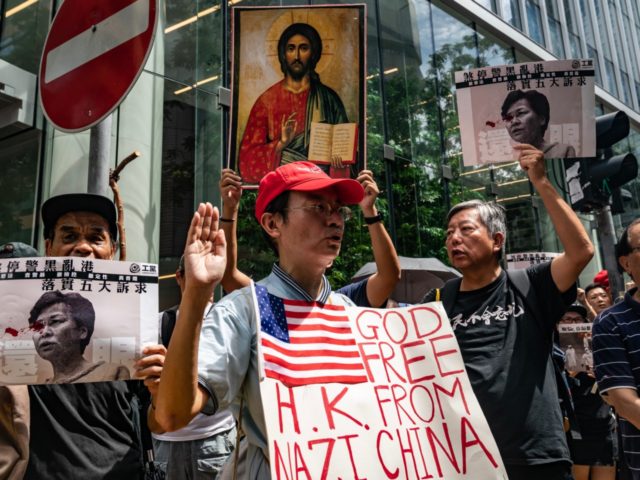WASHINGTON, DC — U.S. President Donald Trump should “leverage” pro-democracy Hong Kong protesters’ demands for human rights, democracy, and full autonomy in ongoing trade negotiations with China, an activist declared on Capitol Hill this week.
During the event Wednesday hosted by the Victims of Communism Memorial Foundation (VCMF) and other groups, SH commented on what the United States can do to help the plight of the ongoing pro-democracy protests.
The former Hong Kong professor turned activist addressed President Trump directly on the event held on Capitol Hill Wednesday under the pseudonym SH out of fear of retaliation, saying: “I hope the U.S. government will wisely use strategies that leverage Hong Kong’s human rights and democratic development in their trade negotiations with the PRC [People’s Republic of China].”
Trump already tied bilateral trade talks to the plight of pro-democracy protesters in Hong Kong last month.
Via Twitter on August 14, Trump urged Communist Party dictator Xi Jinping to ” work humanely with Hong Kong first,” if he “wants to make a deal” on trade.
The primary focus of the protest in Hong Kong, raging since June, was initially a bill that would have allowed the extradition of anyone present in Hong Kong to China if accused of violating Chinese law. Now, Hong Kong’s desire for democracy and full autonomy is the primary goal of the demonstrations.
Last month, Trump made it clear that the trade dispute and pro-democracy protests in Hong Kong are not mutually exclusive.
Activist SH argued that incorporating the pro-democracy Hong Kong protest demands into the trade deal could ultimately end the increasingly violent confrontations between demonstrators and local police officers.
The former professor urged American citizens to pressure their lawmakers to:
Help pass laws or make laws that restrain the CCP’s [Chinese Communist Party’s] grip … into the daily lives of [residents of Hong kong] and to stop police brutality in [the city].
You just need to write on your twitter every day in support of the Hong Kong cause because of our political leaders in Hong Kong as well as in Beijing … they’re scared to death that the international community is standing with us.
She went on to urge U.S. politicians to call on their colleagues to try to pass laws like the Hong Kong Human Rights and Democracy Act that will restraint the Communist Party’s intrusion not just in Hong Kong but throughout the free world.
The bill directs the American government to protect the rule of law, civil liberties, and ensure that China continues to grant autonomy to the city. In recent years, Hong Kong has been losing its limited independence under the One Country, Two Systems policy implemented when China took the region back from Britain.
On August 30, President Trump suggested the ongoing U.S.-China trade war prompted Beijing to pursue a more reasonable response to the demonstrations in Hong Kong. Trump further said Beijing’s response to Hong Kong’s protests would have already escalated to more violent levels absence of the trade talks.
“I really believe China wants to make a deal … I do believe that because of what I’m doing with trade, that’s very much keeping down the temperature in Hong Kong,” he noted at the end of August. However, China said that same month Trump’s efforts to use Hong Kong as a bargaining chip will fail.
“Hong Kong is being used as a chess piece by the US to achieve its aim of raising tariffs,” Terence Chong Tai-leung, an economist at Chinese University of Hong Kong, told the South China Morning Post. “China will likely ignore Trump on Hong Kong … There is no benefit to China in continuing negotiating with the US when tariffs are going up.”
Despite the accumulation of Chinese military troops on the Hong Kong border, Beijing has abstained from a violent military crackdown on demonstrators.
Many in the semi-autonomous Chinese territory have been fearfully anticipating a confrontation. Chinese state media has described the accumulation of forces from the communist country military as a routine annual rotation forces.
A confrontation between demonstrators and the highly modernized people’s liberation army (PLA) has yet to happen.

COMMENTS
Please let us know if you're having issues with commenting.